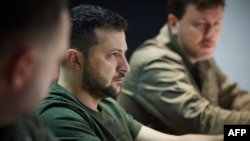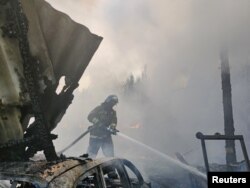After making gains in recent days, Ukrainian fighters fighting in the city of Sievierodonetsk have lost some ground back to Russian forces, the region’s governor said.
“Our defenders managed to undertake a counterattack for a certain time; they liberated almost half of the city. But now the situation has worsened a little for us again,” Serhiy Haidai, governor of the Luhansk region that includes Sievierodonetsk, said Monday.
Britain’s defense ministry said Monday that heavy fighting continued in Sievierodonetsk.
Ukrainian President Volodymyr Zelenskyy made a rare trip Sunday away from Kyiv, traveling to eastern Ukraine where he met with troops and refugees. He made several stops, including in Lysychansk, near Sievierodonetsk.
"What you all deserve is victory - that is the most important thing. But not at any cost," Zelenskyy told Ukrainian troops in a video released on Sunday night.
The Ukrainian leader said Monday he received confirmation from British Prime Minister Boris Johnson “of a new enhanced defense support package,” and that the two discussed ways to unblock Ukrainian ports and avoid a food crisis.
Britain announced Monday it is sending M270 multiple-launch rocket systems that can hit targets up to 80 kilometers away.
“We cannot stand by while Russian long-range artillery flattens cities and kills innocent civilians,” Johnson said.
Ben Wallace, Britain’s defense secretary, said support for Ukraine must change as Russia’s tactics change, and that the new rocket systems “will enable our Ukrainian friends to better protect themselves against the brutal use of long-range artillery, which Putin’s forces have used indiscriminately to flatten cities.”
The British defense ministry also said Russia cruise missiles fired early Sunday hit rail infrastructure in Kyiv, "likely in an attempt to disrupt the supply of Western military equipment to frontline Ukrainian units."
The attack on Kyiv was the first in more than a month.
The Russian defense ministry said its forces had destroyed tanks sent to Kyiv by Western governments.
Russian President Vladimir Putin warned that Moscow would hit targets “we haven’t yet struck” if the West went ahead with plans to send long-range rocket systems to Ukraine.
U.S. President Joe Biden said last week that the United States plans to send $700 million in new weaponry to the Kyiv government that includes four precision-guided, medium-range rocket systems, helicopters, Javelin anti-tank weapon systems, radars, tactical vehicles, spare parts and more.
The U.S. said, however, it will take three weeks to train Ukrainian forces on how to use the rocket systems and deploy them. Washington says it has received assurances from Kyiv it will not use the rockets to target sites inside Russia.
Putin said in a television interview, “All this fuss around additional deliveries of weapons, in my opinion, has only one goal: To drag out the armed conflict as much as possible."
If Ukraine gets longer-range rockets, Putin said, Moscow will "draw appropriate conclusions and use our means of destruction, which we have plenty of, in order to strike at those objects that we haven't yet struck."
He contended that the new weaponry arriving in Ukraine was unlikely to bolster Ukraine’s fortunes and was merely making up for losses of rockets of similar range that they already had.
Ukraine's nuclear plant operator, Energoatom, said one cruise missile buzzed the Pivdennoukrainsk nuclear plant, about 350 kilometers (220 miles) to the south of Kyiv on its way to the capital, citing the dangers of such a near strike.
Some material in this report came from Reuters and The Associated Press.






